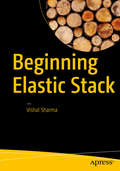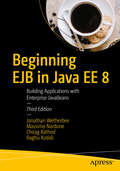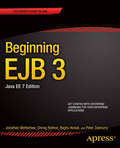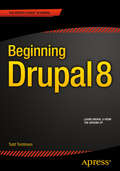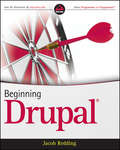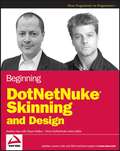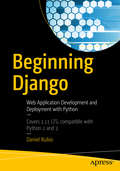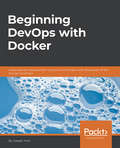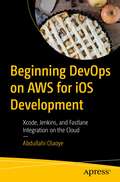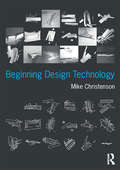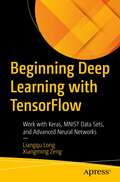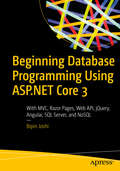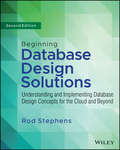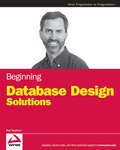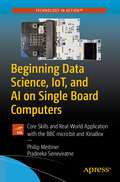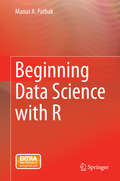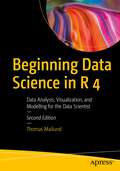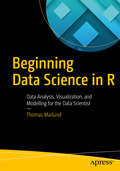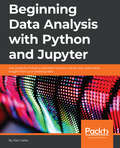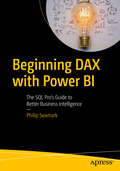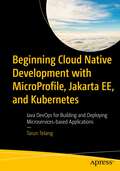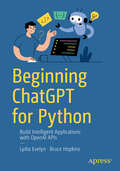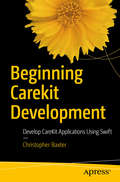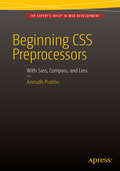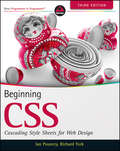- Table View
- List View
Beginning Elastic Stack
by Vishal SharmaLearn how to install, configure and implement the Elastic Stack (Elasticsearch, Logstash and Kibana) – the invaluable tool for anyone deploying a centralized log management solution for servers and apps. You will see how to use and configure Elastic Stack independently and alongside Puppet. Each chapter includes real-world examples and practical troubleshooting tips, enabling you to get up and running with Elastic Stack in record time. Fully customizable and easy to use, Elastic Stack enables you to be on top of your servers all the time, and resolve problems for your clients as fast as possible. Supported by Puppet and available with various plugins. Get started with Beginning Elastic Stack today and see why many consider Elastic Stack the best option for server log management.What You Will Learn:Install and configure LogstashUse Logstash with Elasticsearch and KibanaUse Logstash with Puppet and ForemanCentralize data processingWho This Book Is For:Anyone working on multiple servers who needs to search their logs using a web interface. It is ideal for server administrators who have just started their job and need to look after multiple servers efficiently.
Beginning EJB in Java EE 8: Building Applications With Enterprise Javabeans
by Massimo Nardone Jonathan Wetherbee Chirag Rathod Raghu KodaliBuild powerful back-end business logic and complex Enterprise JavaBeans (EJB)-based applications using Java EE 8, Eclipse Enterprise for Java (EE4J), Web Tools Project (WTP), and the Microprofile platform. Targeted at Java and Java EE developers, with or without prior EJB experience, this book is packed with practical insights, strategy tips, and code examples. As each chapter unfolds, you'll see how you can apply the new EJB spec to your own applications through specific examples.Beginning EJB in Java EE 8 serves not only as a reference, but also as a how-to guide and repository of practical examples to which you can refer as you build your own applications. It will help you harness the power of EJBs and take your Java EE 8 development to the next level. You'll gain the knowledge and skills you’ll need to create the complex enterprise applications that run today's transactions and more.What You'll LearnBuild applications with Enterprise JavaBeans (EJBs) in the new Java EE 8 platformDiscover when to use EJBs over contexts and dependency injectionUse message-driven beans to do tasks asynchronouslyIntegrate EJBs with microservices using the new Eclipse Microprofile projectManage complex enterprise transactions and much moreWho This Book Is ForJava programmers new to enterprise development and for those who may have experience with EJBs but are new to Java EE 8, EE4J, and related Eclipse projects.
Beginning EJB 3: Java EE 7 Edition (Beginning: From Novice To Professional Ser.)
by Jonathan Wetherbee Chirag Rathod Raghu Kodali Peter ZadroznyDevelop powerful, standards-based, back-end business logic with Beginning EJB 3, Java EE 7 Edition. Led by an author team with 20 years of combined Enterprise JavaBeans experience, you'll learn how to use the new EJB 3. 2 APIs. You'll gain the knowledge and skills you'll need to create the complex enterprise applications that run today's transactions and more. Targeted at Java and Java EE developers, with and without prior EJB experience, Beginning EJB 3 is packed with practical insights, strategy tips, and code examples. As each chapter unfolds, you'll not only explore a new area of the spec; you'll also see how you can apply it to your own applications through specific examples. Beginning EJB 3 will serve not only as a reference, but it will also function as a how-to guide and repository of practical examples to which you can refer as you build your own applications. It will help you harness the power of EJBs and take your Java EE 7 development to the next level. What you'll learn How to employ session beans, message-driven beans, and entity beans How to use the updated EJB 3 persistence and object-relational mappings How to choose which EJB option is right for your application How to enrich your application's behavior with CDI services How to test the EJB container inside and out How to migrate from older EJB to the newest EJB APIs Who this book is for This book is for those Java and Java EE developers with and without prior EJB experience. Table of Contents Introduction to the EJB 3 Architecture Session Beans Entities and the Java Persistence API Advanced Persistence Features Message-Driven Beans EJB and Web Services Integrating Session Beans, Entities, Message-Driven Beans, and Web Services Transaction Management EJB Performance and Testing Context and Dependency Injection (CDI) Packaging and Deployment EJB Client Applications EJB Runtime Environments
Beginning Drupal 8
by Todd TomlinsonBeginning Drupal 8 teaches you how to build, maintain, and manage Drupal 8-based web sites. The book covers what Drupal is, using Drupal when building a new web site, installing and configuring Drupal, creating and managing content, managing users, adding functionality to your web site through Drupal modules, and advanced topics on using themes, panels, and views. The book also builds practical examples of common Drupal sites, such as a company website, a community website, and a commerce website, that you can take and expand on to create your own Drupal 8 sites. By reading this book, you will understand the power of the Drupal platform, and why you should be using Drupal if you're not already. Through following the samples in the book, you will quickly build your confidence and your ability to use Drupal. Beginning Drupal 8 gives you the knowledge necessary to build, deploy, and manage web sites on Drupal 8. What you'll learn What Drupal is and why you should use it How to install a basic Drupal web site from scratch How to create content in your new Drupal web site How to manage users on your new Drupal web site How to change the look and feel of your new Drupal web site through themes How to install and configure modules Who this book is for This book is for nontechnical users who want to use Drupal 8 to manage content, as well as developers who are new to Drupal 8. Table of Contents Introduction to Drupal Creating and Managing Content Creating and Managing Users Creating and Using Taxonomy Creating Content Types Creating and Using Views Creating and Using Page Payouts Creating and Using Menus Creating and Using Blocks Theming Your Site Making Your Site Responsive Extending Your Site Through Contributed Modules The Anatomy of a Module Using Multilingual Administering Your Drupal Site Using Drush Using Git Putting It All Together Building a Blog Site Building a Company Website Building a Community Website Building a Commerce Website App A: Modules App B: Learn More
Beginning Drupal
by Jacob ReddingA thorough introduction that lessens the learning curve to building sites with Drupal 7 Drupal 7 is the latest version of the free, open source content management system Drupal. A powerful content management system and framework Drupal has an unfortunate reputation of having a steep learning curve. This guide to Drupal 7 methodically demystifies Drupal and shortening the learning curve. Author Jacob Redding is deeply embedded in the Drupal community, and walks first-time Drupal developers through the installation and configuration of a Drupal system. In-depth information on key areas of Drupal explore the Drupal hook system, Drupal's theming layer, and Drupal's API. You'll also get sample code, and lessons that guide you through various aspects of Drupal. Introduces you to every aspect of Drupal 7 Demystifies key areas of Drupal and shortens the learning curve for even the most novice beginner Features lessons and sample code that offer extra insight into a Drupal web site Exploring simple single website installations and more advanced multiple site installations that share users and/or content. Addresses how to use Drupal's theming layer to your advantage. With this comprehensive and clear book by your side, you will quickly learn to leverage Drupal's impressive power. Note: CD-ROM/DVD and other supplementary materials are not included as part of eBook file.
Beginning DotNetNuke Skinning and Design
by Andrew Hay Shaun WalkerDotNetNuke is an open source framework built on top of the ASP.Net platform. While this system offers an impressive set of out-of-the-box features for public and private sites, it also includes a compelling story for folks who want to present a unique look and feel to visitors.The skinning engine inside of DotNetNuke has strengthened over the course of several years and hundreds of thousands of registered users. The success of its skin and module developer community is another key indicator of the depth and breadth of this technology. The Core Team responsible for the DotNetNuke brand has gone to great lengths to enable a predictable and positive experience for both the visitors of the site and the developers who build them.Note: CD-ROM/DVD and other supplementary materials are not included as part of eBook file.
Beginning Django: Web Application Development and Deployment with Python
by Daniel RubioDiscover the Django web application framework and get started building Python-based web applications. This book takes you from the basics of Django all the way through to cutting-edge topics such as creating RESTful applications. Beginning Django also covers ancillary, but essential, development topics, including configuration settings, static resource management, logging, debugging, and email. Along with material on data access with SQL queries, you'll have all you need to get up and running with Django 1. 11 LTS, which is compatible with Python 2 and Python 3. Once you've built your web application, you'll need to be the admin, so the next part of the book covers how to enforce permission management with users and groups. This technique allows you to restrict access to URLs and content, giving you total control of your data. In addition, you'll work with and customize the Django admin site, which provides access to a Django project's data. After reading and using this book, you'll be able to build a Django application top to bottom and be ready to move on to more advanced or complex Django application development. What You'll Learn Get started with the Django framework Use Django views, class-based views, URLs, middleware, forms, templates, and Jinja templates Take advantage of Django models, including model relationships, migrations, queries, and forms Leverage the Django admin site to get access to the database used by a Django project Deploy Django REST services to serve as the data backbone for mobile, IoT, and SaaS systems Who This Book Is For Python developers new to the Django web application development framework and web developers new to Python and Django.
Beginning DevOps with Docker: Automate the deployment of your environment with the power of the Docker toolchain
by Joseph MuliAutomate the deployment of your environment with the power of the Docker toolchainKey Features Written and reviewed by expert Docker developers The book precisely covers all the essential topics such as building images and managing container swarms required in day to day use for Docker The book includes activities on the docker CLI and exercises such as writing Dockerfiles for Python which will allow you to reinforce the concepts coveredBook DescriptionDevOps with Docker outlines the power of containerization and the influence this innovation has on development teams and general operations. We also get to understand what DevOps really is, the principles involved and how the process contributes to product health, by implementing a Docker workflow. We will learn to interpret Dockerfile syntax, build images and set up containers and images. In addition, we will deploy a Docker image to the Docker Hub. Docker is an open source containerization tool, that makes it easier to streamline product delivery. It helps reduce the time taken to get from a whiteboard sketch of the business to a money-back implementation.This fast-paced book is a perfect amalgamation of theory and hands-on exercises. The book will take you through the basics of Docker and DevOps and why and how they integrate. You will then understand what containers are, and how to create and manage them. Next, we will work on the docker-compose file and CLI. Then we will move to set up a network with the docker-compose tool. Gradually you will learn how to scale a delivery pipeline and multiple deployments with Docker. Lastly, you will grasp the concept of orchestration and learn to implement the delivery of containerized applications.What you will learn Understand how to effectively design and build containers for different applications Set up an environment for testing, avoiding environment mismatch that is breaking production Set up and manage a multi-tier environment. Run, debug, and experiment with applications in a containerWho this book is forThe book is crafted for developers, system architects, junior and mid-level site reliability engineers interested in adapting a docker workflow. They are also required to have a basic knowledge of UNIX concepts such as ssh, ports and logs.
Beginning DevOps on AWS for iOS Development: Xcode, Jenkins, and Fastlane Integration on the Cloud
by Abdullahi OlaoyeApply the principles of DevOps in software development—automated builds, automated tests, and continuous deployment and delivery—to iOS application development on Amazon Web Services (AWS) cloud. This book provides detailed walkthroughs and example source code is provided for the concepts discussed so you can put theory into practical application.You'll start by building a basic iOS application and then dive deep into key AWS Developer tools and services to see how they can be used in iOS application development. Then review the details of the integration of these fully managed AWS services with open-source tools such as Jenkins and Fastlane that allow developers to get the best of both worlds and further help to enhance and increase agility in the development lifecycle of iOS apps. You'll also investigate the Amazon EC2 Mac instance, which allows you to run XCode in a cloud environment for the first time to leverage the flexibility, elasticity, and scale of AWS. It also allows for seamless integration of XCode with fully managed AWS Services from source code control to application deployment. Finally, the book covers how a fully managed Continuous Integration Continuous Deployment (CICD) pipeline can be used to orchestrate all the different components of iOS application development to achieve a fully automated development lifecycle. Get started building your iOS applications using a fully automated process on the AWS Cloud today!What You'll LearnBuild an iOS application using AWS DevOps tools Incorporate continuous deployment in your iOS application development Integrate AWS tooling with Xcode and open source tools such as Jenkins and FastlaneWho This Book Is ForiOS application developers wanting to incorporate DevOps and Cloud Architecture into their development process.
Beginning Design Technology
by Mike ChristensonBeginning Design Technology introduces how design technologies work together, including tools, materials, and software, such as Adobe Photoshop, Adobe Illustrator, Autodesk AutoCAD, and others. It teaches you how to think about each design tool, whether a software program or physical modelmaking, so that you will select one for its strengths for a specific task and know when and how to combine it with other tools. Topics include working with building information, texturing digital and physical artifacts, translating information from one form or file format to another, constructing at full-scale, and making digital and physical models. Chapter Summaries, exercises, discussion questions, a glossary, an appendix of common software commands, and an annotated bibliography will help you find what you need quickly and put the information into practice.
Beginning Deep Learning with TensorFlow: Work with Keras, MNIST Data Sets, and Advanced Neural Networks
by Liangqu Long Xiangming ZengIncorporate deep learning into your development projects through hands-on coding and the latest versions of deep learning software, such as TensorFlow 2 and Keras. The materials used in this book are based on years of successful online education experience and feedback from thousands of online learners. You’ll start with an introduction to AI, where you’ll learn the history of neural networks and what sets deep learning apart from other varieties of machine learning. Discovery the variety of deep learning frameworks and set-up a deep learning development environment. Next, you’ll jump into simple classification programs for hand-writing analysis. Once you’ve tackled the basics of deep learning, you move on to TensorFlow 2 specifically. Find out what exactly a Tensor is and how to work with MNIST datasets. Finally, you’ll get into the heavy lifting of programming neural networks and working with a wide variety of neural network types such as GANs and RNNs. Deep Learning is a new area of Machine Learning research widely used in popular applications, such as voice assistant and self-driving cars. Work through the hands-on material in this book and become a TensorFlow programmer! What You'll LearnDevelop using deep learning algorithmsBuild deep learning models using TensorFlow 2Create classification systems and other, practical deep learning applicationsWho This Book Is ForStudents, programmers, and researchers with no experience in deep learning who want to build up their basic skillsets. Experienced machine learning programmers and engineers might also find value in updating their skills.
Beginning Database Programming Using ASP.NET Core 3: With MVC, Razor Pages, Web API, jQuery, Angular, SQL Server, and NoSQL
by Bipin JoshiHit the ground running with this book to quickly learn the fundamentals of HTML form processing, user authentication, and database CRUD (Create, Read, Update, and Delete) operations using the ASP.NET Core family of technologies. You will utilize cutting-edge and popular technology options from both the server side and client side to help you achieve your web application goals as quickly as possible. Developers who want to learn ASP.NET Core and complementary technologies are often overwhelmed by the large number of options involved in building modern web applications. This book introduces you to the most popular options so that you can confidently begin working on projects in no time. You will learn by example, building a sample application that demonstrates how the same application can be built using different options. This experiential approach will give you the basic skills and knowledge to understand how the options work together so that you can make an informed decision about the available choices, their trade-offs, and code level comparison. After reading this book, you will be able to choose your selected learning path. What You Will LearnDevelop data entry forms in ASP.NET Core, complete with validations and processingPerform CRUD operations using server-side options: ASP.NET Core MVC, Razor Pages, Web APIs, and BlazorPerform CRUD operations using client-side options: jQuery and AngularSecure web applications using ASP.NET Core Identity, cookie authentication, and JWT authenticationUse RDBMS and NoSQL data stores: SQL Server, Azure SQL Database, Azure Cosmos DB, and MongoDB for CRUD operationsDeploy ASP.NET Core web applications to IIS and Azure App Service Who This Book Is ForDevelopers who possess a basic understanding of ASP.NET and how web applications work. Some experience with Visual Studio 2017 or higher, C#, and JavaScript is helpful.
Beginning Database Design Solutions: Understanding and Implementing Database Design Concepts for the Cloud and Beyond
by Rod StephensA concise introduction to database design concepts, methods, and techniques in and out of the cloud In the newly revised second edition of Beginning Database Design Solutions: Understanding and Implementing Database Design Concepts for the Cloud and Beyond, Second Edition, award-winning programming instructor and mathematician Rod Stephens delivers an easy-to-understand guide to designing and implementing databases both in and out of the cloud. Without assuming any prior database design knowledge, the author walks you through the steps you’ll need to take to understand, analyze, design, and build databases. In the book, you’ll find clear coverage of foundational database concepts along with hands-on examples that help you practice important techniques so you can apply them to your own database designs, as well as: Downloadable source code that illustrates the concepts discussed in the book Best practices for reliable, platform-agnostic database design Strategies for digital transformation driven by universally accessible database design An essential resource for database administrators, data management specialists, and database developers seeking expertise in relational, NoSQL, and hybrid database design both in and out of the cloud, Beginning Database Design Solutions is a hands-on guide ideal for students and practicing professionals alike.
Beginning Database Design Solutions
by Rod StephensThe vast majority of software applications use relational databases that virtually every application developer must work with. This book introduces you to database design, whether you're a DBA or database developer. You'll discover what databases are, their goals, and why proper design is necessary to achieve those goals. Additionally, you'll master how to structure the database so it gives good performance while minimizing the chance for error. You will learn how to decide what should be in a database to meet the application's requirements.
Beginning Data Science, IoT, and AI on Single Board Computers: Core Skills and Real-World Application with the BBC micro:bit and XinaBox
by Pradeeka Seneviratne Philip MeitinerLearn to use technology to undertake data science and to leverage the Internet of Things (IoT) in your experimentation. Designed to take you on a fascinating journey, this book introduces the core concepts of modern data science. You'll start with simple applications that you can undertake on a BBC micro:bit and move to more complex experiments with additional hardware. The skills and narrative are as generic as possible and can be implemented with a range of hardware options. One of the most exciting and fastest growing topics in education is data science. Understanding how data works, and how to work with data, is a key life skill in the 21st century. In a world driven by information it is essential that students are equipped with the tools they need to make sense of it all. For instance, consider how data science was the key factor that identified the dangers of climate change -- and continues to help us identify and react to the threats it presents. This book explores the power of data and how you can apply it using hardware you have at hand. You'll learn the core concepts of data science, how to apply them in the real world and how to utilize the vast potential of IoT. By the end, you'll be able to execute sophisticated and meaningful data science experiments - why not become a citizen scientist and make a real contribution to the fight against climate change. There is something of a digital revolution going these days, especially in the classroom. With increasing access to microprocessors, classrooms are are incorporating them more and more into lessons. Close to 5 million BBC micro:bits will be in the hands of young learners by the end of the year and millions of other devices are also being used by educators to teach a range of topics and subjects. This presents an opportunity: microprocessors such as micro:bit provide the perfect tool to use to build 21st century data science skills. Beginning Data Science and IoT on the BBC micro:bit provides you with a solid foundation in applied data science.What You'll Learn · Use sensors with a microprocessor to gather or "create" data · Extract, tabulate, and utilize data it from the microprocessor · Connect a microprocessor to an IoT platform to share and then use the data we collect · Analyze and convert data into information Who This Book Is For Educators, citizen scientists, and tinkerers interested in an introduction to the concepts of IoT and data on a broad scale.
Beginning Data Science with R
by Manas A. Pathak"We live in the age of data. In the last few years, the methodology of extracting insights from data or "data science" has emerged as a discipline in its own right. The R programming language has become one-stop solution for all types of data analysis. The growing popularity of R is due its statistical roots and a vast open source package library. The goal of "Beginning Data Science with R" is to introduce the readers to some of the useful data science techniques and their implementation with the R programming language. The book attempts to strike a balance between the how: specific processes and methodologies, and understanding the why: going over the intuition behind how a particular technique works, so that the reader can apply it to the problem at hand. This book will be useful for readers who are not familiar with statistics and the R programming language.
Beginning Data Science in R 4: Data Analysis, Visualization, and Modelling for the Data Scientist
by Thomas MailundDiscover best practices for data analysis and software development in R and start on the path to becoming a fully-fledged data scientist. Updated for the R 4.0 release, this book teaches you techniques for both data manipulation and visualization and shows you the best way for developing new software packages for R. Beginning Data Science in R 4, Second Edition details how data science is a combination of statistics, computational science, and machine learning. You’ll see how to efficiently structure and mine data to extract useful patterns and build mathematical models. This requires computational methods and programming, and R is an ideal programming language for this. Modern data analysis requires computational skills and usually a minimum of programming. After reading and using this book, you'll have what you need to get started with R programming with data science applications. Source code will be available to support your next projects as well.Source code is available at github.com/Apress/beg-data-science-r4.What You Will LearnPerform data science and analytics using statistics and the R programming languageVisualize and explore data, including working with large data sets found in big dataBuild an R packageTest and check your codePractice version controlProfile and optimize your codeWho This Book Is ForThose with some data science or analytics background, but not necessarily experience with the R programming language.
Beginning Data Science in R
by Thomas MailundDiscover best practices for data analysis and software development in R and start on the path to becoming a fully-fledged data scientist. This book teaches you techniques for both data manipulation and visualization and shows you the best way for developing new software packages for R.Beginning Data Science in R details how data science is a combination of statistics, computational science, and machine learning. You’ll see how to efficiently structure and mine data to extract useful patterns and build mathematical models. This requires computational methods and programming, and R is an ideal programming language for this. This book is based on a number of lecture notes for classes the author has taught on data science and statistical programming using the R programming language. Modern data analysis requires computational skills and usually a minimum of programming. What You Will LearnPerform data science and analytics using statistics and the R programming languageVisualize and explore data, including working with large data sets found in big dataBuild an R packageTest and check your codePractice version controlProfile and optimize your codeWho This Book Is ForThose with some data science or analytics background, but not necessarily experience with the R programming language.
Beginning Data Analysis with Python And Jupyter [Book]: Use powerful industry-standard tools to unlock new, actionable insight from your existing data
by Alex GaleaUse powerful industry-standard tools to unlock new, actionable insight from your existing dataKey Features Get up and running with the Jupyter ecosystem and some example datasets Learn about key machine learning concepts like SVM, KNN classifiers and Random Forests Discover how you can use web scraping to gather and parse your own bespoke datasets Book DescriptionGetting started with data science doesn’t have to be an uphill battle. This step-by-step guide is ideal for beginners who know a little Python and are looking for a quick, fast-paced introduction. Get to grips with the skills you need for entry-level data science in this hands-on Python and Jupyter course. You’ll learn about some of the most commonly used libraries that are part of the Anaconda distribution, and then explore machine learning models with real datasets to give you the skills and exposure you need for the real world.We'll start with understanding the basics of Jupyter and its standard features. You'll be analyzing an example of a data analytics report. After analyzing a data analytics report, next step is to implement multiple classification algorithms. We’ll then show you how easy it can be to scrape and gather your own data from the open web, so that you can apply your new skills in an actionable context. Finish up by learning to visualize these data interactively.What you will learn Identify potential areas of investigation and perform exploratory data analysis Plan a machine learning classification strategy and train classification models Use validation curves and dimensionality reduction to tune and enhance your models Scrape tabular data from web pages and transform it into Pandas DataFrames Create interactive, web-friendly visualizations to clearly communicate your findings Who this book is forThis course is ideal for professionals with a variety of job descriptions across large range of industries, given the rising popularity and accessibility of data science. You'll need some prior experience with Python, with any prior work with libraries like Pandas, Matplotlib and Pandas providing you a useful head start.
Beginning DAX with Power BI: The SQL Pro’s Guide to Better Business Intelligence
by Philip SeamarkAttention all SQL Pros, DAX is not just for writing Excel-based formulas! Get hands-on learning and expert advice on how to use the vast capabilities of the DAX language to solve common data modeling challenges. Beginning DAX with Power BI teaches key concepts such as mapping techniques from SQL to DAX, filtering, grouping, joining, pivoting, and using temporary tables, all aimed at the SQL professional. Join author Philip Seamark as he guides you on a journey through typical business data transformation scenarios and challenges, and teaches you, step-by-step, how to resolve challenges using DAX. Tips, tricks, and shortcuts are included and explained, along with examples of the SQL equivalent, in order to accelerate learning. Examples in the book range from beginner to advanced, with plenty of detailed explanation when walking through each scenario. What You’ll Learn Turbocharge your Power BI model by adding advanced DAX programming techniquesKnow when to use calculated measures versus calculated columnsGenerate new tables on the fly from existing dataOptimize, monitor, and tune Power BI to improve performance of your modelsDiscover new ideas, tricks, and time-saving techniques for better models Who This Book Is For Business intelligence developers, business analysts, or any SQL user who wants to use Power BI as a reporting tool. A solid understanding of SQL is recommended, as examples throughout the book include the DAX equivalents to SQL problem/solution scenarios.
Beginning Cloud Native Development with MicroProfile, Jakarta EE, and Kubernetes: Java DevOps for Building and Deploying Microservices-based Applications
by Tarun TelangGet ready to develop microservices using open source Eclipse MicroProfile and Jakarta EE, and deploy them on Kubernetes/Docker. This book covers best practices for developing cloud-native applications with MicroProfile and Jakarta EE.This book introduces you to cloud-native applications and teaches you how to set up your development environment. You'll learn about the various components of MicroProfile, such as fault tolerance, config, health check, metrics, and JWT auth. You'll develop a RESTful web service made up of some microservices. You'll deploy your application on Docker and Kubernetes.After reading this book, you'll come away with the fundamentals you need to build and deploy your first cloud-native Java-based app.What You'll LearnBuild your first cloud-native Java-based app with the open source MicroProfile platform, and Jakarta EE 10 APIs Develop a RESTful web service using MicroProfile and Jakarta EEDiscover and explore the key components of the MicroProfile framework, such as config, metrics, health, JWT authentication, and moreDeploy your cloud-native application on the Kubernetes container orchestration platformGet up to speed with other popular technologies such as Docker containers, Kubernetes clusters, and ZipkinWho This Book Is ForProgrammers with at least some prior experience in Java programming who may be new to MicroProfile and Jakarta EE. Some prior experience with Java-based microservices and web development is recommended, but not required.
Beginning ChatGPT for Python: Build Intelligent Applications with OpenAI APIs
by Bruce Hopkins Lydia EvelynUnlock the future of software development and empower yourself to elevate your Python applications by harnessing the power of AI as this field continues to grow and evolve. Perfect for beginner to intermediate Python programmers, this book breaks down the essentials of using ChatGPT and OpenAI APIs. You'll start with the basics, learning to authenticate, send prompts, generate responses, test in the Playground, and handle errors with ease. Each chapter includes hands-on exercises that bring concepts to life, demonstrating different API functionalities and practical applications. You'll master models like GPT-4o, GPT-4, GPT-3.5, Whisper, and DALL-E, enabling you to enhance your applications with cutting-edge AI. Discover how generative AI tools like ChatGPT can automate tedious tasks rather than replace jobs. Leverage ChatGPT’s powerful Natural Language Processing (NLP) capabilities to handle various formats of unstructured text within your Python apps. Quickly see how easy it is to use ChatGPT as your AI-pair programmer, boosting your productivity and speed. This step-by-step guide will have you creating intelligent chatbots that can automatically process messages from Slack or Discord. With Beginning ChatGPT for Python, you'll master the ChatGPT and OpenAI APIs, building intelligent applications that offer a personalized and engaging user experience. What You’ll Learn Connect with the ChatGPT and OpenAI APIs and send effective prompts. Harness parameters like temperature and top_p to create unique and engaging responses from ChatGPT. Create an intelligent assistant bot for Slack that automates tasks and enhances productivity. Develop a bot that can moderate conversations and manage communities on Discord. Add context to your prompts to get more accurate and relevant responses. Who This Book Is For Python developers and enthusiasts who aspire to employ OpenAI and ChatGPT in the creation of intelligent applications to enhance productivity.
Beginning CareKit Development: Develop CareKit Applications Using Swift
by Christopher BaxterThis book offers readers a fantastic introduction into creating CareKit based applications using the Swift language. It starts with the basics and provides a step-by-step guide to learning all aspects of creating a CareKit iOS application that could serve as the basis for a patient care plan. Beginning Carekit Development introduces the key modules and concepts of CareKit starting off by installing and building the open source framework. Developers will then dive deeper, learning how to implement their own care plan by example. The book will present an illness and complete care plan utilizing all the key modules. Readers will then be able to fully use CareKit to develop health care plans. This is the future of patient care and health tracking apps that put patients in control of their day to day care. Throughout the book, app developers, hardware manufacturers, and health care professionals will get tips and suggestions that show how to use and talk about this exciting new technology. The CareKit framework has the simple interface and the secure functionality that will change existing markets. Beginning Carekit Development is the guide to the new world of CareKit. What you'll learn: The basics of CareKit development from creating a simple "Hello World" app up to full fledged care plan application. How to integrate CareKit with HealthKit, ResearchKit, and other Apple devices to create an ecosystem of connected health care devices. How to assess and share treatment insights with caregivers and key contacts through CareKit with access to key health information. Who this book is for: Developers working in healthcare and medical device fields will use this book to develop medical apps meant to integrate directly with the ubiquitous Apple devices everyone has.
Beginning CSS Preprocessors: With SASS, Compass.js and Less.js
by Anirudh PrabhuLearn how preprocessors can make CSS scalable and easy to maintain. You'll see how to write code in a very clean and scalable manner and use CSS preprocessor features such as variables and looping, which are missing in CSS natively. Reading Beginning CSS Preprocessors will make your life much simpler by showing you how to create reusable chunks of code. In addition to coding enhancements, you'll also learn to automate processes such as generating image sprites and minifying code. Beginning CSS Preprocessors is your guide for getting started with CSS preprocessors. This book shows you how to use CSS in your day-to-day work and thus be smart and efficient at writing CSS. What you'll learn What are preprocessors What are the known preprocessor frameworks What are the features of Sass (Syntactically Awesome Stylesheets) What is Compass (COMPrehensive ASSembler) What is Less (Leaner SS) Who this book is for UI developers who are well acquainted with CSS and want to make their workflow better. Table of Contents Chapter 1: Introduction to Preprocessors Chapter 2: Introduction to SASS Chapter 3: Advanced SASS Chapter 4: Development with Less Chapter 5: Introduction to Compass
Beginning CSS
by Richard York Ian PounceyCompletely updated material and new examples show you what CSS can doWith the latest versions of Firefox, Safari, Internet Explorer, and other browsers released, CSS is more essential than ever. This beginner guide demonstrates how cascading style sheets can be used to define styles to items in Web pages, rather than format each item individually. Each lesson in this full-color book has been methodically revised to be more concise and efficient, making your learning experience as productive as possible.Covers the latest in CSS, including the new features of Internet Explorer, Firefox, Safari, and Google ChromeReviews the vast improvements to mobile browsers and how CSS can work with themProvides helpful examples and walks you through real-world solutions to common hurdlesDiscusses embedded fonts, compatibility tables, and cross-browser bug scenariosBeginning CSS, Third Edition gets you completely up to date so that you can start using CSS in the newest Web and mobile browsers today!
